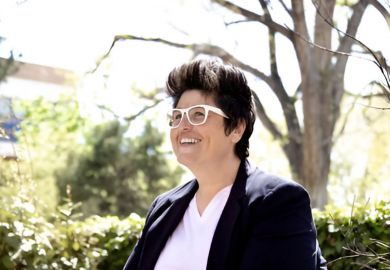As vice-chancellor of the University of Brighton since 2015, Debra Humphris has been one of the UK sector’s few openly LGBT leaders. Now, having taken over as chair of the University Alliance mission group, she is committed to putting diversity and inclusion at the centre of the higher education debate.
Professor Humphris, whose post-school education started in the NHS as a student nurse, said the alliance aimed to develop a strategy for how it can be a “collective, constructive, where necessary a disruptive voice in terms of HE in society”, particularly on issues such as the future of work.
The mission group is made up of 21 universities that describe themselves as “leaders in technical education” and professional training.
With Professor Humphris having started as chair in September after being elected by members, and Vanessa Wilson having taken over as chief executive in March, the group is looking afresh at its strategy.
On diversity, Professor Humphris said: “I would like us, as an alliance, to have a leading voice in all issues around equality and diversity...Just because I happen to be gay, doesn’t mean everybody has to focus on that. What it should do is bring into relief that we’re committed to driving diversity and inclusion of all individuals in our institutions.”
She added that it was “important we have HE leaders who reflect the diversity of society”, and that, although some progress had been made in terms of growth in the number of female vice-chancellors, there was still “a long way to go” on wider diversity.
Professor Humphris said of her experiences in the NHS and universities that “there are pockets of unacceptable intolerance wherever you look, if you look for them”.
“So yes, I’ve experienced prejudice and I have learned a huge amount from it,” she added.
Professor Humphris continued: “I still find it astonishing, sadly, that in 2019 I’m still having to have conversations with men about gender equality – who seem to believe it’s a women’s issue.”
And she said: “I look at the BME attainment data across the sector, and we have a lot to do.”
Alliance universities educate NHS staff, “teachers, scientists, technicians, engineers, a whole range of skills and professionals needed in society, and the fundamentals of public service”, Professor Humphris said.
Alliance institutions are modern universities, many with their roots in local industry. Civic roles remain important today and alliance universities are “energetic about cities and regions”, Professor Humphris said.
On the use of graduate earnings data by the government as a performance metric to judge universities, she pointed out that alliance universities have 24,000 students in creative industries subjects who “won’t exit with high-paid jobs to start with” but will be part of a sector with huge economic benefits for the UK.
And she highlighted the example of graduates who enter the voluntary sector: “Why would we say they were any less valuable than someone doing algorithms for a bank in central London?”
Professor Humphris said that the NHS “essentially gave me my post-18 education: I’m immensely grateful to it and deeply committed to it”.
She studied for her master’s and doctoral degrees (the latter on the implementation of policy into clinical practice) while working full-time for the NHS. After working in the Department of Health and regional health authorities, she went on to become pro vice-chancellor for students at the University of Southampton and vice-provost for education at Imperial College London.
Brighton was not a member of any mission group when Professor Humphris took over as vice-chancellor in 2015, but joined the alliance soon after.
Before Brighton, she had “only ever worked in Russell Group universities. I experienced then the powerful learning and collaboration that came out of being in a mission group and a network of colleagues…sharing ideas, testing each other in terms of challenges and opportunities.”
Lobbying strength was another benefit she observed in the Russell Group, she added.
On the current outlook for the sector in England, Professor Humphris warned that “government policy is becoming unclear on universities” after the commissioning of the Augar review of English post-18 education – and the government’s consequent apparent decision to reject its recommendations on higher education fees.
It was, she added, “a phase of extraordinary uncertainty – through all of that we [the alliance] have to remain a powerful voice making the case for why it’s really important to have a high-level educated workforce. Our future society post-Brexit is going to…need even more of an educated workforce.”
POSTSCRIPT:
Print headline: LGBT v-c aims to drive diversity in HE
Register to continue
Why register?
- Registration is free and only takes a moment
- Once registered, you can read 3 articles a month
- Sign up for our newsletter
Subscribe
Or subscribe for unlimited access to:
- Unlimited access to news, views, insights & reviews
- Digital editions
- Digital access to THE’s university and college rankings analysis
Already registered or a current subscriber?







